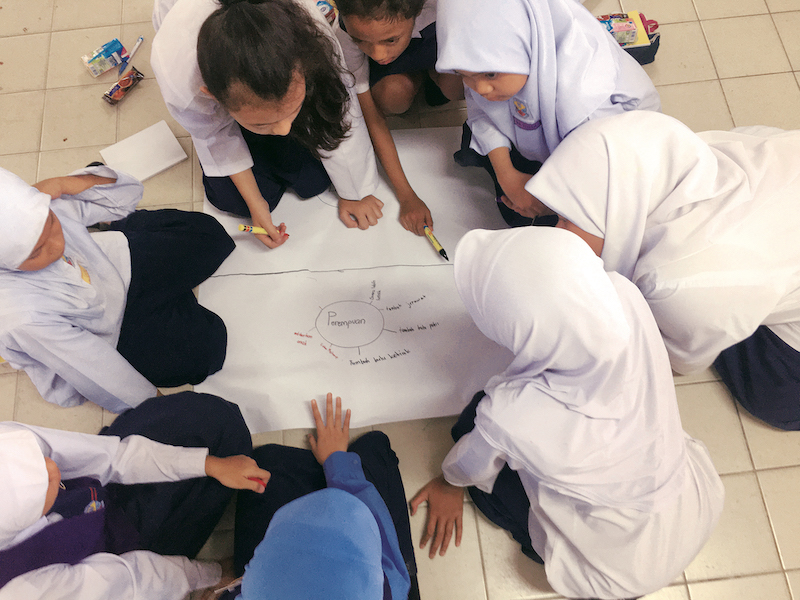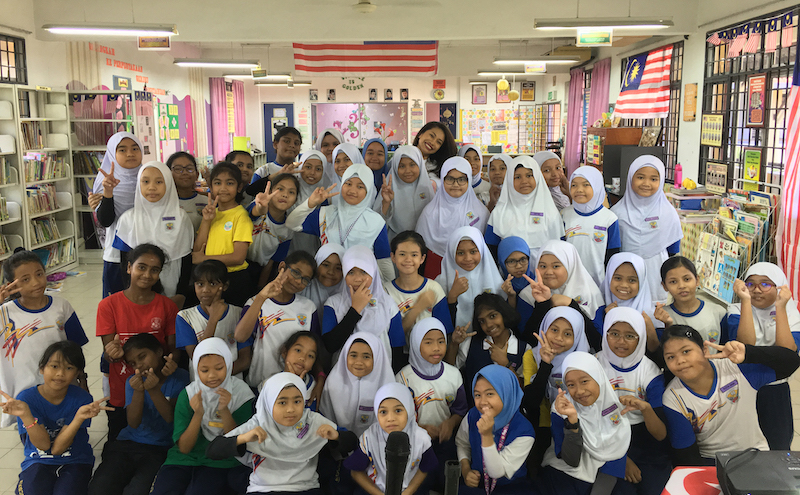
Aishah is the founder of Spot (Soroptimist Puberty Organising Toolkit), a movement that provides comprehensive sexuality education (All photos: Spot)
The awareness of sexual assault and violation or abuse of personal privacy is severely lacking, even in this day and age. Such knowledge is a privilege of education delivered in a safe, non-threatening manner, and providing access to it is something childhood sexual assault survivor Siti Aishah Hassan Hasri decided would be her life’s calling. “Sexuality education is something I grew up without,” she rues. “That’s why I want to make sure that no one else does.”
Aishah is the founder of Spot (Soroptimist Puberty Organising Toolkit), a movement that provides comprehensive sexuality education through age-appropriate and culturally sensitive approaches. Established in 2015, Spot uses carefully designed modules to equip girls of all ages with confidence and resilience to make informed decisions regarding their well-being.
Although the seeds for a cause like this were planted by her past experiences, it was an assignment in university that cemented Aishah’s decision to establish Spot. “I was an enumerator for the medical faculty of the University Malaya Medical Centre, tasked with collecting data from communities in PPR (Program Perumahan Rakyat) flats,” she shares. “In the course of my interviews with these families, from children to parents and grandparents, I discovered a prevalence of dangerous attitudes relating to reproduction and sexual behaviour. Additionally, many children were left alone for many hours as parents had to work — an unfortunate reality for many lower-income families — and the ‘village’ around to raise them wasn’t always a positive one.”
This exposure largely informed Aishah’s approach in designing Spot’s modules, which is to encourage a positive attitude towards reproductive health, bodily autonomy and personal and social development. “Sexuality education is key to reducing issues like sexual assault and underaged or unplanned pregnancies. We need to know how our bodies work, the science behind bodily functions.” Since it started, Spot’s modules have been delivered to 10,617 girls in 79 schools in six states across the country, aided by 133 volunteers who have donated 2,500 hours of their time.
According to the United Nations, comprehensive sexuality education is a curriculum-based process of teaching and learning about the cognitive, emotional, physical and social aspects of sexuality. It improves sexual and reproductive health-related outcomes, such as HIV infection and adolescent pregnancy rates, which in turn helps expand education opportunities. It disrupts harmful gender norms and promotes gender equality, which helps reduce or prevent gender-based violence and hence creates safe and inclusive learning environments.
img_6818.jpg

It is also a key component of a good-quality education: As an active teaching and learning approach centred on students, it helps develop skills such as critical thinking, communication and decision-making, which empower students to take responsibility for and control their actions and help them become healthy, responsible and productive citizens.
This forms the basis of Aishah’s approach with Spot, which is funded by corporate contributions and donations from the public. “We started out with more menstruation-centric, science-based content, pushing the idea of puberty with dignity. We began with girls aged nine to 15 but since then, we have expanded our reach to children as young as four years old, and parents and teachers as well,” she says.
“Our modules are designed in alignment with the International Technical Guidance of Sexuality Education, and are updated frequently. But I make sure they apply to a local audience, and complement what the Ministry of Education has already created. Our focus is on science and personal development. A typical workshop would cover topics like safe spaces, respect between all members of the family and goal-setting for the future.”
Aishah says Spot’s goal is prevention, achieved by empowering women to be aware of their body, how it works and their rights over it. “For girls to be able to carry themselves with pride and dignity — that is so important,” she stresses. “Women should be empowered to speak for themselves on behalf of others, they should be brave enough to ask for opportunities and they should be able to internalise this knowledge, and advocate for it. Sexuality education is a subset of this. We started out only talking to girls, but now so many schools are asking for content that the boys can learn about as well.”
Spot’s delivery methods are youthful, engaging and highly interactive, using games and tools. The team of volunteers engages trained performing arts specialists and gamification experts for high-impact delivery. In pre-pandemic days, all the workshops were done in-person at schools around the country; 2020’s lockdowns have demanded a change in approach. “We managed to move online quite quickly, but digitising sexual education modules isn’t easy — we have to get the right language, and get the format right too,” Aishah says.
img_7150.jpg

At present, she is working with Unicef’s DSE (digital sexual education) Asia-Pacific community to understand the opportunities for digital sexuality education by exploring what young people search for online, the range of digital sexuality education platforms currently available in the region, the impact of these platforms and issues of online safety. Aishah is well aware that many young people do not have access to the internet and has made reaching out to them one of her goals for this year.
As she could not travel last year to conduct her workshops, Aishah had more time to grow Spot. She joined SEEd.Lab, a social enterprise education lab programme run by Petronas and Tata Consultancy Services that aims to groom and develop groups of youths to set up sustainable social enterprises.
A major challenge continues to be finding and retaining the talents required for Spot to keep growing, alongside bread-and-butter issues like funding, dealing with the ever-changing levels of red tape in the various government and non-governmental departments she works with, and effects of the pandemic itself.
Going into 2021, she hopes to address these issues as well. “Interestingly, one thing that hasn’t been a challenge is pushback from religious leaders,” she says. “In fact, the first school I worked with was headed by an ustaz who was so encouraging about the work that I do.”
Besides preventing Spot from reaching the usual number of children, the lockdowns have resulted in a steep rise in violence directed at women and children — a trend seen in Malaysia and elsewhere around the world. But Spot’s work is a marathon, not a sprint; there are battles that will be lost as the war is slowly won. “It takes one person to break a destructive cycle of violence,” Aishah states. “I believe that by influencing one person’s life, positively, we can replicate that experience and influence many more.”
This article first appeared on Jan 25, 2021 in The Edge Malaysia.


